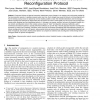Free Online Productivity Tools
i2Speak
i2Symbol
i2OCR
iTex2Img
iWeb2Print
iWeb2Shot
i2Type
iPdf2Split
iPdf2Merge
i2Bopomofo
i2Arabic
i2Style
i2Image
i2PDF
iLatex2Rtf
Sci2ools
96
Voted
TC
2008
2008
An Efficient and Deadlock-Free Network Reconfiguration Protocol
Component failures and planned component replacements cause changes in the topology and routing paths supplied by the interconnection network of a parallel processor system over time. Such changes may require the network to be reconfigured such that the existing routing function is replaced by one that enables packets to reach their intended destinations amid the changes. Efficient reconfiguration methods are desired which allow the network to function uninterruptedly over the course of the reconfiguration process while remaining free from deadlocking behavior. In this paper, we propose, evaluate, and prove the deadlock freedom of a new network reconfiguration protocol that overlaps various phases of "static" reconfiguration processes traditionally used in commercial and research systems to provide performance efficiency on par with that of recently proposed "dynamic" reconfiguration processes but without their complexity. Simulation results show that the proposed O...
Efficient Reconfiguration | Information Technology | Reconfiguration Protocol | Static Reconfiguration | TC 2008 |
Related Content
| Added | 15 Dec 2010 |
| Updated | 15 Dec 2010 |
| Type | Journal |
| Year | 2008 |
| Where | TC |
| Authors | Olav Lysne, José Miguel Montañana, Jose Flich, José Duato, Timothy Mark Pinkston, Tor Skeie |
Comments (0)

